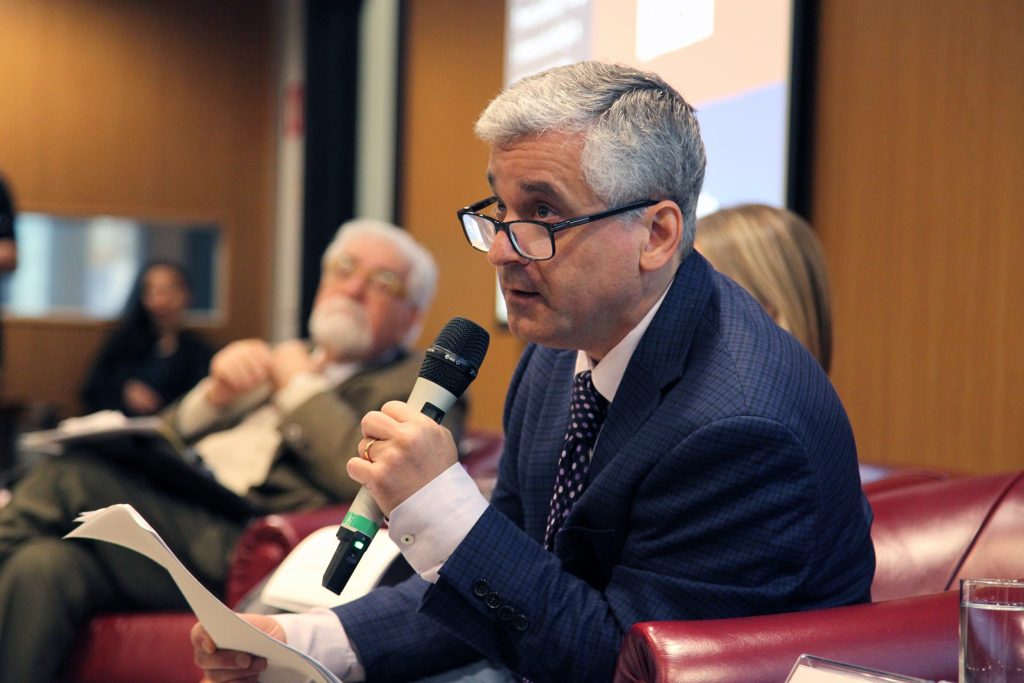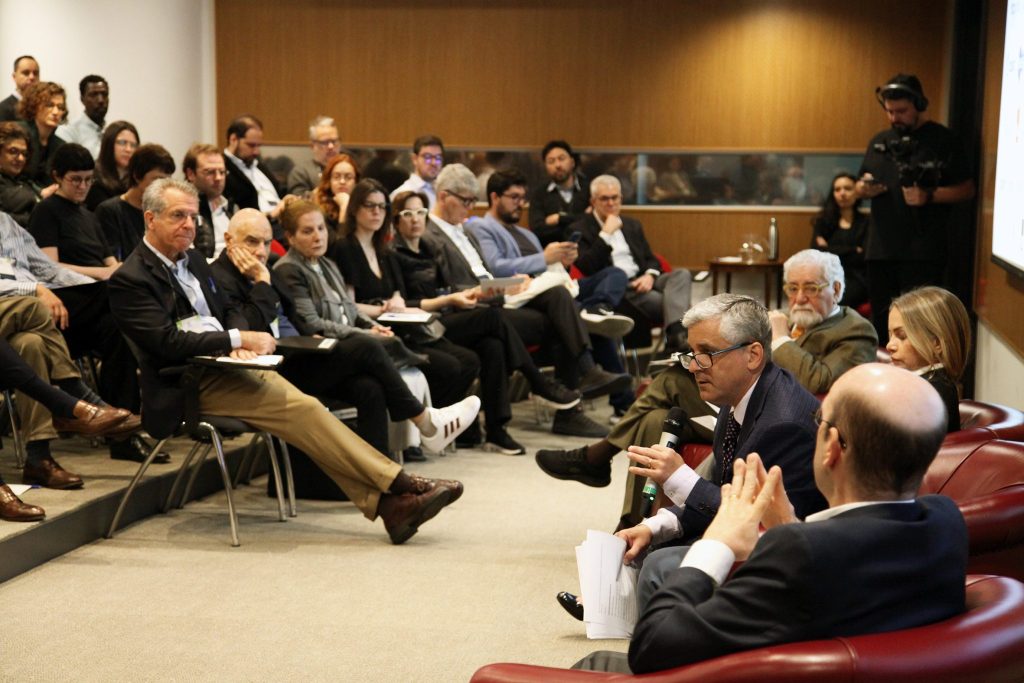Steven Levitsky: ‘Trump represents a greater threat to democracy today than in 2016, when he was first elected’
The American political scientist participated in a debate at the Fundação FHC to mark the institution’s 20th anniversary.
If Donald Trump wins the U.S. presidential election on November 5 this year, he will be more prepared than in 2016, when he first secured the White House, to manipulate state institutions to persecute rivals, silence critics, undermine civil liberties, and incite political violence, among other authoritarian actions. This was the stark warning delivered by Mr. Steven Levitsky, an American political scientist, during his lecture “Why Has Democracy Reached a Breaking Point in the United States?” The event marked the 20th anniversary of the Fundação Fernando Henrique Cardoso at its headquarters in downtown São Paulo.
“Unlike in Brazil, institutions in the United States failed to hold the former president accountable for his attacks on democracy, and now Trump is running for the White House again, with a strong chance of winning. In 2016, he didn’t understand how the state functioned; he had no clear plan. This time, the Republican candidate has been very explicit about his intentions if he returns to office: he has declared that he will staff the administration with loyalists, use the Justice Department to investigate and prosecute his political opponents, leverage the state to punish media critics, and deploy the military to suppress protests. This is one of the most overtly authoritarian political campaigns I’ve ever witnessed. Not even Chávez, Erdogan, or Orbán made such promises,” said Mr. Levitsky, co-author of the bestselling book How Democracies Die (2018), written with Daniel Ziblatt.
According to the Harvard professor, while Trump may not succeed in turning the United States into a dictatorship, a win would plunge the country into a dangerous and turbulent period. “Although institutions have not acted to block Trump’s candidacy, the system of checks and balances remains resilient. The fact that we are a federation, with state governments holding significant independence, will prevent Trump from fully consolidating a dictatorship. However, he will likely violate basic civil liberties, repress protests, and encourage political violence, potentially by paramilitary groups, which is extremely dangerous,” Mr. Levitsky cautioned.
On the international stage, a potential Trump victory would undermine global support for democracy, potentially destabilizing countries where democracy is still fragile and serving as an inspiration for the far right in Europe and other parts of the world. “If he returns to the White House, Trump will be a model autocratic leader, and during his term, the United States will not lift a finger to protect democracy worldwide,” said Mr. Levitsky.
If Trump loses the election to Democratic candidate Kamala Harris, and especially if the defeat is more decisive than current polls suggest, the Republican Party may be forced to reconsider its recent trajectory of endorsing the former president’s authoritarian agenda and return to its roots as a center-right party, which for 150 years played a pivotal role in American democracy. However, Mr. Levitsky does not believe the Republican Party will fully revert to its mid-20th century identity—liberal in economics, conservative in social values, and supportive of an active foreign policy (though the outcomes of such policies are open to debate). In his view, ethnic nationalism, protectionism, and isolationism have become ingrained in the party’s identity. He hopes the party will at least return to respecting the basic rules of democratic governance.
“One of the biggest problems in the United States today is that one of the two main parties is no longer committed to the rules of the democratic game. Parties and politicians who are dedicated to democracy must always adhere to three principles: accept electoral results when they lose, reject political violence, and completely sever ties with extremist and anti-democratic forces. Since 2020, when Trump refused to accept his defeat by Mr. Joe Biden, and most Republicans lacked the courage to confront him, the Republican Party has violated these three essential rules of democratic conduct,” Mr. Levitsky explained.

Trumpism is a reaction to the country’s transition towards a multiracial democracy
According to Mr. Steven Levitsky—who visited Brazil to promote his latest book, “Tyranny of the Minority: Why American Democracy Reached the Breaking Point,” published in Brazil under the title “Como Salvar a Democracia” (Companhia das Letras) — since the 1960s, and especially since the late 1980s, the U.S. has been undergoing a transition toward a multiracial democracy. In this evolving landscape, Black, Latino, and Asian populations are becoming increasingly prominent in politics, the economy, and society—developments that are perceived as a threat by the white Christian population, historically accustomed to shaping the country’s direction since its independence in 1776.
“We are witnessing an unprecedented shift in the social hierarchy of the U.S. The percentage of the population identifying as white Christian has dropped from 80% in the late 1960s to 43% in 2016. For more than two centuries, white Christians held nearly all leadership positions in public administration, the private sector, and society— they were the politicians, judges, CEOs, university heads, and T.V. hosts. This is now changing right before our eyes. The number of African-American and Latino legislators has quadrupled since the late 1980s, growing from 28 in 1980 to 114 today. In 1969, all nine Supreme Court justices were white; today, we have one African-American justice and one Latina justice. This transformation is also evident in corporations, universities, T.V. networks, advertising, and cultural spheres,” said Mr. Levitsky.
“Losing dominant social status can create a sense of existential threat. Many of Trump’s voters feel that the country they once knew is slipping away from them, which drives some toward extremism. According to a poll by the American Enterprise Institute, 56% of Republican voters agree that the traditional American way of life is disappearing so quickly that force may be necessary to stop it,” Mr. Levitsky explained.
The political scientist pointed out that the U.S. has gone through two experiments in building a multiracial democracy. The first occurred after the American Civil War (1861–1865), but it was largely crushed, particularly through the efforts of the Democratic Party in the southern states, which included preventing the Black population from exercising their voting rights. The second experiment began in the 1960s with the civil rights movement and has intensified since the late 1980s, as rapid demographic changes have provoked fierce resistance, this time from the Republican Party.
“Starting with Mr. Barry Goldwater (Republican presidential candidate in 1964), and later under Richard Nixon and Ronald Reagan, the Republicans explicitly sought to attract white, Christian, conservative voters— and they succeeded. The Republican Party became the party of conservative white Christians, with its electoral base primarily concentrated in less populated, rural states. Between 1968 and 1988, when the U.S. electorate still had a white Christian majority, the Republican Party won every popular vote except for Jimmy Carter’s victory in 1976, which was largely due to the Watergate scandal,” Mr. Levitsky explained.
Since 1992, the Republican Party has won the popular vote only once, in 2004. However, due to the Electoral College system—composed of 538 delegates representing the states—the party reached the White House in 2000 and 2016. Even if a candidate has fewer national votes, they can still secure the presidency by obtaining 270 Electoral College votes.
“Parties and politicians who are dedicated to democracy must always adhere to three principles: accept electoral results when they lose, reject political violence, and completely sever ties with extremist and anti-democratic forces,” Mr. Levitsky explained.
In 2000, Democrat Al Gore received 500,000 more votes than George W. Bush nationally but lost in the Electoral College after the Republican candidate won the state of Florida. Despite a razor-thin margin of victory, Bush secured all of the state’s delegates, reaching the 270 electoral votes needed to win the presidency. In 2004, running for re-election, President Bush won 3 million more votes than Democrat Mr. John Kerry. In 2016, Ms. Hillary Clinton garnered over 3 million more votes than Mr. Donald Trump nationwide. Yet, Mr. Trump claimed more delegates in the Electoral College, securing the White House. The Democratic Party won both the popular vote and the Electoral College in the 1992, 1996, 2008, 2012, and 2020 elections.
Faced with increasing challenges in winning the national popular vote, the Republican Party has employed various tactics in Republican-controlled states to make it more difficult for Black and Latino voters to participate. Meanwhile, Congress has obstructed efforts to pass legislation that would ensure equal access to the ballot.
“American democracy wouldn’t have reached the breaking point we’re seeing today if the U.S. were like other democracies, where the electoral majority rules. Less populous, more rural states are overrepresented in the Electoral College, the Senate, and the Supreme Court. In 2016, Trump lost the national popular vote but still won the presidency. The Republican Party lost the popular vote for the Senate yet claimed a majority in the House. This minority president and Senate went on to nominate three Supreme Court justices, securing a conservative majority on the court. If the popular vote had prevailed, the Supreme Court would have a liberal majority today. This is what we call minority rule,” said Mr. Levitsky.

Authors propose 15 reforms to renew American democracy
In their book Tyranny of the Minority: Why American Democracy Reached the Breaking Point, Steven Levitsky and Daniel Ziblatt propose 15 reforms aimed at revitalizing American democracy. These include revising the Electoral College system, adjusting state representation in Congress, updating the voting process, and instituting term limits for Supreme Court justices.
“But these are long-term reforms that won’t have an immediate effect in safeguarding democracy in the United States, which is currently facing imminent threats. So, what can be done?” Mr. Levitsky asked. According to him, the U.S. has historically embraced a laissez-faire approach, treating elections like a marketplace where all ideas are debated and the best will naturally prevail. “History shows that this notion is naive, at least in politics. The ‘good guys’ don’t always win in democratic processes. Consider the autocratic leaders like Chávez, Orbán, Bukele, and others who won majorities in legitimate elections but, once in power, undermined the democratic rule of law,” he explained.
Mr. Levitsky outlined several strategies for protecting democracies from internal threats:
- Empower the state with the tools necessary to prevent authoritarian politicians and movements from competing in elections.
- When facing authoritarian threats, parties committed to democracy must put aside political and ideological differences to form broad coalitions.
- If institutions and parties fail, society must mobilize to prevent democratic backsliding.
“Several democracies have adopted what’s called militant democracy, where candidates or parties that openly threaten the democratic rule of law are banned from politics. This model was first used in post-World War II Germany and has since spread to other parts of the world, including Latin America and Brazil. “Look at the contrast between what has happened in Brazil and the United States over the last six years. Both Bolsonaro and Trump are far-right populists; both led poor administrations, lost their re-election bids, and questioned the results. But while Trump is free to run for the White House again, with a good chance of winning, Bolsonaro has been banned from politics for eight years for attacking the electronic voting system and threatening democracy,” he continued.
Mr. Levitsky reminded the audience that the 14th Amendment to the U.S. Constitution stipulates that officials who participate in insurrections should be barred from running for office again. However, the Supreme Court blocked efforts to use this law to prevent Donald Trump from running for the White House in 2024. He also criticized the Senate for its failure to convict Trump during impeachment proceedings following the January 6, 2020, attack on the Capitol by hundreds of his supporters, just days before the inauguration of President Joe Biden.
“The Judiciary Branch and the legislature have failed to hold Trump accountable for his actions against democracy. What tools do we have left when institutions fail to protect us from authoritarian threats? The best alternative is political parties. Mainstream parties have a duty to expel extremists from their ranks and explicitly condemn political violence,” Mr. Levitsky stated.
He praised Brazil’s right-wing political leaders for quickly recognizing Lula’s victory in the second round of the 2022 elections, preventing Bolsonaro from advancing his claims of election fraud. He also commended the overwhelming condemnation by political forces of the January 8, 2022, attacks on the headquarters of Brazil’s three branches of government in Brasília. “In contrast, most Republican leaders continued to defend Trump even after the January 6 attacks on the Capitol. Even today, with Trump under indictment, Republicans continue to support him. It is clear that the Republican Party will not protect us from Trump,” Mr. Levitsky added.
According to Mr. Levitsky, pro-democracy parties must set aside ideological and political differences to form broad coalitions that make it harder for authoritarian forces to come to power or stay in power. “We saw this happen last year in Poland when several opposition parties united to prevent the Law and Justice party from securing another term. This year in France, the center-right and center-left came together to form a ‘cordon sanitaire,’ once again preventing the National Front from gaining power. In 2018, parts of Brazil’s right were complicit in Bolsonaro’s election, but they sided with Lula in the second round of 2022. These are successful examples of democratic forces uniting against authoritarian threats,” he said.
Society must mobilize to prevent democratic backsliding
When neither the state nor political parties can protect democracy, it falls to society to mobilize. Business leaders, workers, professionals, religious figures, intellectuals, and artists must draw a red line in defense of the democratic rule of law. “We saw this happen in 2023, in Israel, when thousands took to the streets weekly for months to protest a judicial reform proposed by the Netanyahu administration that would have weakened the Supreme Court. Recently, thousands in Germany protested against the anti-immigration agenda of the far-right AfD movement. In Brazil, civil society also mobilized during the Bolsonaro administration to defend the democratic rule of law and the integrity of electronic voting,” said Mr. Levitsky.
“Civil society tends to respond more strongly to anti-democratic threats when it has the experience of losing democracy and living under authoritarian regimes. Germany and Brazil have that history and experience; the United States does not. After January 6, 2021, some of the top Republican business leaders pledged to stop donating to Trump after he rejected the election results. However, they soon broke their promise and resumed financial support. Religious leaders have not condemned Trump’s radical plans for mass deportations. Even America’s most well-informed elites seem unaware of the urgency in preventing his return to the White House,” he continued.
“What’s happening in the U.S. today should not be happening. As political scientists, there are many things we don’t know, but we agree on two points about democracy: first, rich democracies don’t die, and second, old democracies don’t die. So, American democracy should be safe. But it’s not. If the U.S. doesn’t reform its political system to meet the challenges of the 21st century, it risks seeing its democracy shipwrecked,” Mr. Levitsky concluded.
Otávio Dias is the content editor at the Fundação FHC. He is a political and international affairs journalist, a former correspondent for Folha de São Paulo in London, and former editor of the estadao.com.br website.
Translation: Todd Harkin, Harkin Translations






























